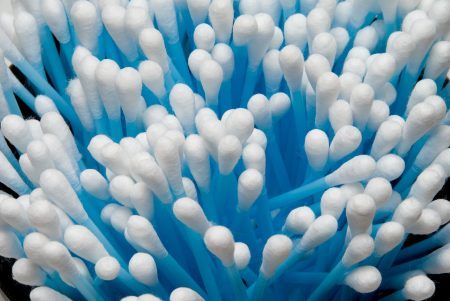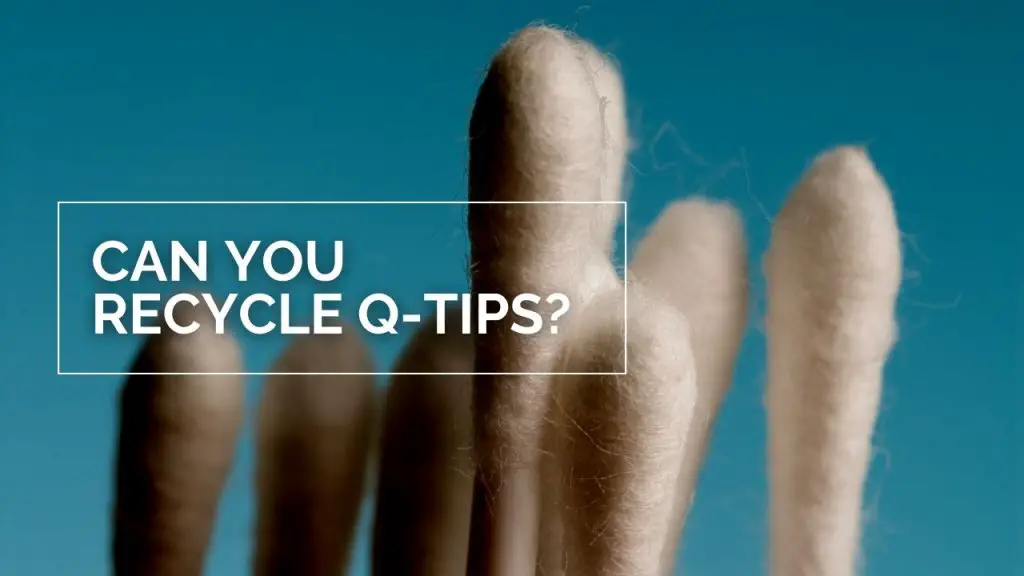We all know recycling is important – not only for the natural environment but for humans too. Recycling can create a beneficial impact on our planet. Unfortunately, proper protocols for recycling, i.e., how or where to recycle, aren’t easy to follow.
These days, q-tips are the talk of the town. You can find them everywhere – from bathrooms to home cabinets to medical practitioner offices. Q-tips are used for touch-ups during makeup and can be used to dab medical creams on injuries and wounds.
Often, we use Q-tips to clean ear wax from our ear canal or fix our makeup. After using these q-tips, we throw them in the trash and don’t think twice. But do you ever wonder if you can recycle Q-tips?
Q-tips cannot be recycled. However, they are completely biodegradable if the stick is not made of plastic. It would be best if you considered composting Q-tips as their small size means that they often find their way into oceans and other water bodies when sent to landfills.
Q-tips consist of cotton swabs made from pure cotton; when composted, they are environmentally safe (biodegradable). If stored properly as per guidelines, i.e., in a cool and dry place, they can be with you for years.
Can Q-Tips Cotton Swabs Be Recycled?
No matter where you are, the sustainability of products is a topic of discussion for many.
Well, it’s no mystery that when people buy cotton swabs, they ignore the labels and warnings behind the package. But do you know what other things they miss out on? They are unaware of whether the product they use is eco-friendly or environmentally threatening.
Luckily, the Q-tip’s cotton swabs are biodegradable when composted. After using q-tips, you can throw them into compost bins. In the containers, these cotton swabs will break down by several microorganisms and bacteria.
The sleeve and tray packs of the q-tips are recyclable after the top lid is pulled out.
Are Q-tips Biodegradable?
Q-tips are completely made of biodegradable materials! Rather than throwing them away, you should consider putting them into your compost pile. All cotton swabs are biodegradable if they don’t use plastic sticks.
Composition of Q-Tips
Before stating whether Q-tips are recyclable, it is essential to look over the raw materials used to make these products.
Q-tips are manufactured from 100% pure cotton fiber and natural materials. This makes them biodegradable and resistant to many hot washes. The cotton-tipped applicator (or stick) of the Q-tip’s cotton swab is made from a high-quality, durable bonded paper and paperboard, which is sustainably sourced from sustainable forests, produced to hold on to its form, and safe to use.
The cotton tips are initially treated with an antimicrobial agent, Triclosan, and are attached to the applicator’s end with an adhesive called Methocel.

Are Q-tips Harmful to the Environment?
The answer to this question is yes. Given the small size and lightweight of the Q-tips, they quickly pollute the oceans.
Although most Q-tips are now made from bonded paper and paperboard, previously, they were manufactured using plastics. Even today, many countries haven’t switched their manufacturing ways and continue to make Q-tips cotton swabs out of plastic.
These q-tips eventually make their way to the waters when thrown in the trash. Over time, these plastic Q-tips have become a significant source of ocean pollution. In fact, not only do they pollute the water, but they also harm marine life, particularly tiny seahorses.
Always remember that you should properly discard Q-tips or cotton buds in the trash can. Flushing them down the toilet can block sewage systems and create environmental pollution and endless havoc for creatures living under the water.
How Do You Clean Reusable Q-tips?
Generally, reusable Q-tips can be cleaned with hot water and soap. Make sure you scrub them for at least 60 seconds to remove any bacteria and other microbes. Reusable Q-tips are a good way to limit the amount of waste put into landfills and your environmental impact.
Recycling and the Environment
From biodegradability to the recycling of Q-tips, all these issues are a significant concern when preserving natural resources and creating a pollution-free environment. While using Q-tips, there are specific issues that need to be addressed.
Q-tips can create massive marine pollution, and these cotton swabs can harm marine life. Many of us use Q-tip cotton swabs and flush them down the toilet. As a result, these swabs end up in the oceans, creating pollution. Therefore, it is important to work towards solutions to solid waste problems.
The packaging of Q-tips should be made from recycled materials or materials that can be recycled later. Additionally, companies should perform an initial screening and testing of the various products and ingredients used during the manufacturing of Q-tips to ensure that they are not harmful to the environment. Also, the introduction of recyclable cotton swabs can cut down on the danger and threats.
What Are Better Alternatives To Q-Tips?
Q-tips aren’t the worst hygiene products that you should give up on using. Due to their various properties, Q-tips are biodegradable when composted, and the inner packaging of the product can also be recycled. If you set up a proper waste bin for such items and avoid flushing them down the toilet, you will not pollute the environment.
While many of us can’t give up on using q-tips, it is wise to look for products that impose no or minimal threats to nature and human health. This is why many companies have started making Q-tips with sticks made from paper rather than plastic.
Several eco-friendly alternatives to traditional cotton swabs (also known as Q-tips) exist. Here are a few options to consider:
- Bamboo cotton swabs: These are made from bamboo, a sustainable and renewable resource. Bamboo cotton swabs are biodegradable, making them more environmentally friendly than traditional cotton swabs.
- Reusable silicone ear swabs: These ear swabs are made from silicone and can be washed and reused, reducing the need for disposable cotton swabs. They are also hypoallergenic and gentle on the skin.
- Recycled paper swabs: These are made from recycled paper and are biodegradable. They may not be as absorbent as cotton swabs, but they can still be used for cleaning and applying makeup or other products.
- Biodegradable cotton swabs: These are made from biodegradable materials and can break down in the environment. They may not be as widely available as traditional cotton swabs, but they are a more environmentally friendly option.
It’s important to note that while these alternatives are more eco-friendly than traditional cotton swabs, they should still be used with caution and disposed of properly to minimize their environmental impact.
Conclusion
Look around your home, kitchen, or backyard and search for materials that can be recycled and create a positive impact on your lifestyle and the environment around you.
Incorporating eco-friendly products into your daily life can be a great solution to reducing waste and being kinder to your planet. When it comes to treating hygiene products, the process isn’t so intuitive.
Q-tips cotton swabs are biodegradable, but how they are manufactured still differs for many countries. Therefore, it is important to rethink and reconstruct such items and make them more environmentally friendly without compromising their usability.

